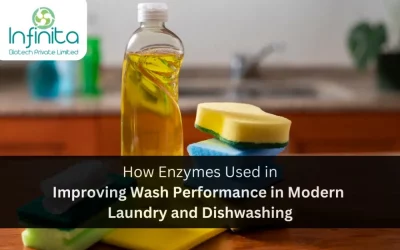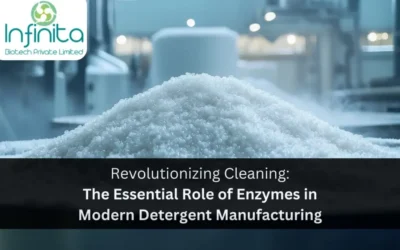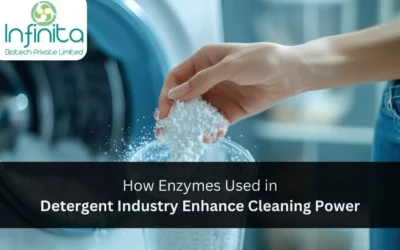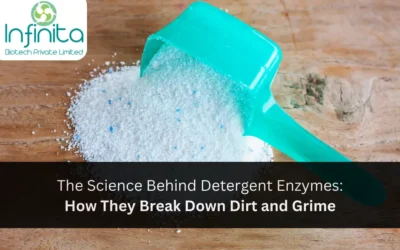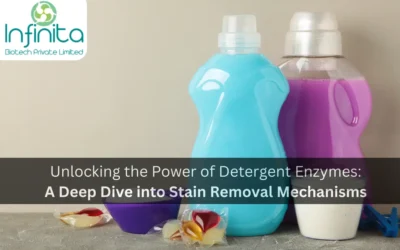Safe Handling Of Enzymes In Detergent Manufacturing
Enzymes are one of the essential constituents in the detergent manufacturing industry. Detergent enzymes are proteins that help in catalyzing chemical reactions. Enzymes in detergent help break down stains, and thus, you get good washing performance. Some of the essential detergent enzymes include protease, amylases, and lipases. If not taken care of properly, enzymes can be hazardous for the health of workers in detergent manufacturing industries. Thus, this article will serve as a guide for the safe handling of detergent enzymes.
Education to employees
It is essential to educate employees and contractors about the importance of safe handling of enzymes. Proper training for employees is necessary for the safe use of the material in industrial settings. All detergent manufacturing units need to make sure that employees and contractors handling the enzymes are adequately trained, and they have adequate knowledge and training about the potential handling of enzymes. Different instruction manuals, safe practices, and operating procedures for the handling of enzymes should be available at the individual workplace. Thus, it is the responsibility of employers as well as workers to get enough training and information needed to handle detergent enzymes.
Air monitoring
An air monitoring program should be such that it has the potential to establish and evaluate the potential for employees’ exposure to airborne enzymes. Air monitoring helps in proving that control measures are functioning correctly and if additional control measures are needed. A successful air monitoring program will need trained professionals who can conduct monitoring as well as analysis of air samples. The goal of the air monitoring program will help in providing adequate information about health and safety measures and to make sure that employees, as well as the organization, are safe from all types of hazards.
Plant operation
Before manufacturing detergent containing enzymes, it is essential to review the complete product line. In addition to this, conducting tests before the manufacturing process begins will help in safe operation. Some of the significant areas that need review include
● Storage areas: it is vital to make sure that enzyme preparations are distant from general storage areas. It is also essential to have adequate spill containment measures in the industry. All spill control equipment must be readily available.
● Manufacturing system: all conveyors and areas conveying enzymes containing products should be up to the mark and properly enclosed. The equipment used should be such that it can minimize aerosolization.
● Ventilation system: it is crucial to maintain the adequate inward flow of air where the enzymes or enzyme products rescue. Industrial settings need to be sure that proper scrubbing and filtration systems are in place.
● Monitoring system: the air samplers should be placed in areas where enzyme aerosols get out. A proper air sampling strategy needs to be available at detergent manufacturing units.
● Workplace system: all employees involved in detergent enzymes handling needs to have proper education and knowledge about the health effects of enzyme, control measures, and contingency measures
Medical monitoring program
It is also important to monitor employees about the potential risk of exposure to detergent enzymes. A good program needs to be functioning so that it can assess and monitor the health of employees working in detergent manufacturing units. Regular surveys can help ensure that any adverse health effects can avert and deal with before any significant hazard. Before employing someone in companies that consists of enzymes, it is vital to go through the following significant points:
● Medical history: specific references need to be made to any record of allergies, asthma, eczema, or respiratory diseases.
● Respiratory questionnaire: Respiratory questionnaire should be in such a way that it can ask employees about their respiratory health.
● Medical examination: Medical examination is of utmost importance before an employee has to perform tasks related to the handling of enzymes.
● Pulmonary Function Test (PFT): A PFT is vital to conduct on employees before they start working with enzymes. The PFT test will create a baseline that can be easy to compare after the employee finishes tasks related to enzymes.
● Skin prick test: The skin prick test is a test that can help you to get an idea about common allergens. The skin prick test can help determine the atopy of an individual.
Assessment of equipment performance and maintenance
All equipment that is in use at a detergent manufacturing unit needs proper assessment and maintenance. Without routine maintenance, the performance of equipment can degrade over time. Spillage of detergent enzymes can occur because of equipment leakage and process malfunction. It is essential to know the real cause behind regular spillage so that necessary precautions can be taken.
System monitoring and maintenance: every organization that manufactures detergents should have a proper system for monitoring and maintenance of equipment and machines. A suitable plan will make sure that the ventilation system and static pressure are at appropriate levels. Maintenance at regular intervals will also make sure that cleaning up the duct doesn’t take too much time. Following are the daily plan regarding system monitoring and maintenance:
● Daily visual check of equipment and system
● Operations should be within the baseline, and it should be documented before starting the manufacturing process.
● We scheduled duct and equipment inspection and cleaning.
● Mechanical lubrication for fan, filter, and airlocks
● Documentation at every step.
Behaviour observation system
The primary intent of behaviour observation is to ensure that no unsafe behaviour can occur in the workplace. Behaviour observation systems provide a simple yet powerful tool to eliminate all kinds of dangerous behaviour. Most of the exposure accidents are due to unsafe action on the part of employees. Thus, it is essential to have a Behaviour Observation System to ensure maximum safety.
Following are the significant elements of the Behaviour Observation System.
● Selection of critical behaviour
● Organizational involvement
● Appointment of trained observers
● Air sampling data from workplace
● Program goals and change procedures
● Guidelines for proper observation as well as confrontation
In a behaviour observation system, the task of the observer is essential. Thus, the observer needs to plan the tour and stop for 30 seconds at each location to check the safe handling of detergent enzymes. The observer needs to observe as well as confront workers and employees about any loopholes.
Dealing with spillage and cleaning of plant and equipment
The use of improper and improvised clean-up methods can result in airborne-enzymes. Clean-up operations are an essential source of peak-enzyme exposure. This can be easily managed by taking care of a combination of equipment and by following procedures. Cleaning up of spilt enzymes should always be done by using a vacuum cleaning system, and the system should be fitted with HEPA filtration modes. A vacuum that does not include HEPA filtration will not be adequate as it will generate significant airborne dust and aerosols.
If the detergent manufacturing unit is facing the problem of liquid spillage, proper sorbent material should be in use to clean the spillage.
Respiratory protection is essential for all cleaning and spillage operations. Specific equipment needs to be present for cleaning purposes. This area should fulfill requirements similar to isolated discharge areas.
Managing an organization and industry that relates to detergent manufacturing can be quite challenging. Different types of enzymes are involved in detergent manufacturing, and if you don’t pay adequate attention, separate hazardous accidents can happen. Thus, following safety guidelines is extremely important while handling enzymes in detergent. Go through this safety guide and follow all steps mentioned. Let us know if you need detailed knowledge about how to handle other safety protocols in detergent manufacturing units.

